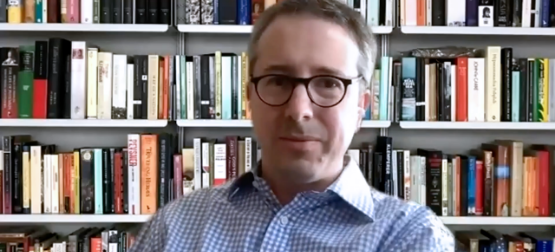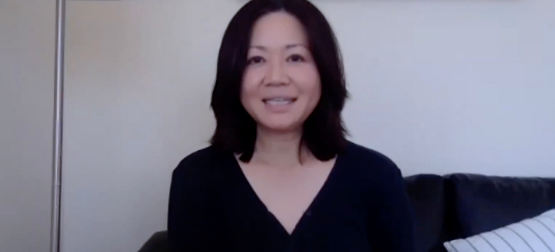Listen to our second Big Conversation podcast, Mohamed El Erian explores the issues every business leader should have on their radar.
Beyond the pandemic
Future risks: key takeaways from our session
From health to the global economy and geopolitics, the future is full of risks. We were delighted to welcome Mohamed El-Erian - chief economic adviser at Allianz, former chair of President Obama's Global Development Council and one-time CEO of PIMCO – for our most recent Big Conversation to help us plot a way through them.
Mohamed offered his take on everything from the future of multilateralism to dangers of rising inflation; you can read the key takeaways below, watch the full session or listen to our Big Conversation podcast, where our partners Eric Mahr and Aimen Mir take a deeper dive with Mohamed into US/China relations.
WATCH Mohamed El-Erian on the future of multilateralism.
Key takeaways
Governments around the world have become more inward-looking. As a champion of free trade and multilateralism, the United States' decoupling from the international system following the election of President Trump caused a ripple effect that continues to this day. In Mohamed’s view this has led to a re-contracting of international trade relationships. For him multilateralism is merely a set of ‘contracts’ and if they’re not delivered, they'll be re-contracted by other countries.
Underpinning this is a shift in power between the East and the West, which is giving rise to different approaches to multilateralism and regionalism. China’s Belt and Road Initiative (BRI) is an example of regionalism. The US, whilst more inward-looking of late, is hardwired for multilateralism. These two powers and two systems – multilateralism and regionalism – are on a collision course.
Tensions between the United States and China are set to continue, and the ‘dual option countries’ that have ties to both are terrified of being forced to choose. The UK’s U-turn on the use of Huawei technologies and Australia's defensive attitude towards China's activities in the South China Sea are just two examples.
The same goes for Western businesses, who have traditionally sold to China and used China as a manufacturing base. Today there is increasing pressure on these businesses to produce ‘in China, for China, by the Chinese’, in return for access to China's growing economy.
One of the most common questions Mohamed is asked involves inflation – specifically how high will it get and how persistent will it be? Mohamed believes the central banks’ desire to label inflation as ‘transitory’ (be it ‘persistent’, ‘rolling’ or ‘extended’) is a mistake that will only serve to drive up wages and further fuel the inflationary spiral. A transitory phenomenon is one in which people do not change their behaviours, yet behaviours are changing in front of our eyes. We've seen strikes and the great resignation, while wage earners are starting to regain their bargaining power. Mohamed gave the example of the agricultural machinery manufacturer John Deere, where employees rejected a 6 per cent pay increase, went on strike and were offered a 10-11 per cent rise instead. We have to recognise that inflation will be around for a while, and if we're not careful, we could be sleep walking into a recession.
There remains hope that inflation spikes and then fades away, but we should be prepared to address increasing inequality. It’s clear that the poor will be hurt the most by inflation]. They lose out because they can't protect themselves, the rich can. The likely consequence is one of more extreme political outcomes and a more polarised society.
As a world, we are not ‘wired’ to deal with multiple disruptions happening at the same time, as they are now. We think we are operating in what Mohamed calls a ‘bell distribution’, where we believe a certain outcome is likely and discount more extreme events. In reality we’re living with far more uncertainty, and these unthinkable outcomes are more likely than they were 10 or 20 years ago. Fundamental structural changes, aided by technology and more relaxed barriers to innovation, mean we're suddenly able to do things we couldn't do before. The development of Covid-19 vaccines is one encouraging example; the manipulation of elections is not
In Mohamed’s view, once we’ve been displaced from our current situation, we’re more likely to be displaced further than reverting back to where we started. Our world, marked by rapid disruption, is one in which the vulnerable are more likely to become more vulnerable.
In this context, Mohamed draws the conclusion that the step towards bigger government is happening for a good reason. Previously, we fell in love with finance being our principal growth driver, losing sight of more powerful forces such as infrastructure, education and labour productivity. Now you see governments reinvesting in these drivers of genuine economic growth and pursuing conditions that enable ‘levelling up’. The fact the UK Conservatives and the Democratic Party are taking the same approach proves this is a phenomenon that spans the political spectrum.
Beyond the pandemic debate series
What we do
Everything we do will help grow, strengthen and defend your business.
Our global teams span specialisms, regions and industries to deliver against three fundamental client needs: transactional, regulatory, risk.



